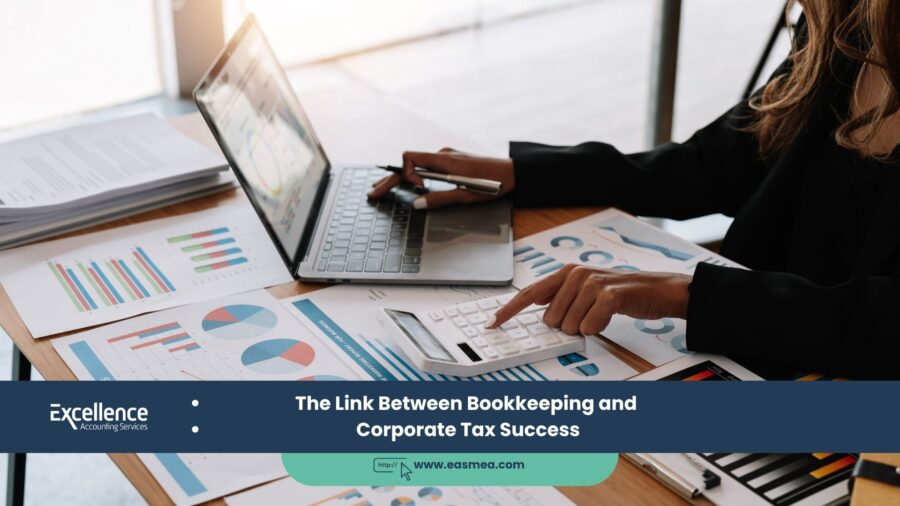The Unbreakable Link: Why Meticulous Bookkeeping is the Key to UAE Corporate Tax Success
With the establishment of the UAE Corporate Tax (CT) regime, many businesses have focused intensely on the final stages of the tax process: calculating liabilities and filing returns. However, this is like focusing on the roof of a house before ensuring the foundation is solid. The true foundation of corporate tax success—of accuracy, compliance, and optimization—is not built in the weeks before the filing deadline, but in the daily, disciplined practice of meticulous bookkeeping.
- The Unbreakable Link: Why Meticulous Bookkeeping is the Key to UAE Corporate Tax Success
- Part 1: Bookkeeping as the Bedrock of Tax Compliance
- Part 2: How Accurate Bookkeeping Directly Impacts Your Tax Calculation
- Part 3: The High Cost of Poor Bookkeeping
- What Excellence Accounting Services (EAS) Can Offer
- Frequently Asked Questions (FAQs)
- Build Your Business on a Rock-Solid Financial Foundation.
Bookkeeping is often mistakenly viewed as a simple, administrative task of data entry. In the new tax era, this perception is not just outdated; it’s dangerous. Every single number that appears on your final tax return has its origins in your company’s books. An error, omission, or misclassification at the bookkeeping stage can cascade into an incorrect tax calculation, leading to potential overpayments, underpayments, penalties, and significant business risk. This guide will illuminate the unbreakable link between bookkeeping and tax, demonstrating why investing in high-quality financial record-keeping is the most strategic decision a business can make for achieving long-term corporate tax success.
Key Takeaways: Bookkeeping & Tax
- Foundation of Compliance: Your corporate tax return is a direct summary of your bookkeeping records. Without accurate books, a compliant return is impossible.
- Deduction Maximization: Proper categorization of expenses in your books is essential to ensure you claim every legitimate tax deduction you are entitled to.
- Audit Readiness: Well-maintained books with supporting documents are your primary defense in the event of an FTA audit.
- Financial Clarity: Accurate bookkeeping provides the reliable financial data needed for strategic business decisions, far beyond just tax.
- Risk Mitigation: Proactive bookkeeping minimizes the risk of errors, penalties, and legal issues with the tax authorities.
Part 1: Bookkeeping as the Bedrock of Tax Compliance
Before any tax calculation can begin, a business must have a clear and accurate picture of its financial performance and position. This picture is painted transaction by transaction, day by day, through the process of bookkeeping.
From Daily Transactions to Final Tax Return
Think of your business’s financial data as a pyramid. At the very bottom are the individual transactions: a sales invoice, a supplier payment, a rent expense. Professional accounting and bookkeeping is the process of recording, classifying, and organizing these transactions. This data is then summarized into financial statements (the middle of the pyramid). Finally, your corporate tax return sits at the very top—a figure that is wholly dependent on the integrity of every layer beneath it.
If the foundational layer of transaction recording is flawed—if invoices are missing, expenses are miscategorized, or revenue is not reconciled—the entire structure becomes unstable. The financial statements will be inaccurate, and consequently, the tax return will be incorrect.
Part 2: How Accurate Bookkeeping Directly Impacts Your Tax Calculation
The link between bookkeeping and tax is not abstract; it is direct and tangible. Here’s how specific bookkeeping practices influence the key components of your tax return.
1. Calculating Accurate Taxable Income
Your company’s net profit, as shown on the Profit & Loss statement, is the starting point for determining taxable income. This P&L is a direct output of your bookkeeping.
- Complete Revenue Recognition: Meticulous bookkeeping ensures all sources of revenue are captured and recorded in the correct period. This prevents under-reporting of income, a major compliance risk. An expert accounts receivable process is vital.
- Correct Expense Recording: All business expenses must be accurately recorded to ensure the starting profit figure is correct.
2. Maximizing Legitimate Deductions
This is where bookkeeping offers the most significant opportunity for tax optimization. To be deductible, an expense must be documented and incurred “wholly and exclusively” for the business.
- Expense Categorization: A skilled bookkeeper won’t just record an expense; they will categorize it correctly. For instance, distinguishing between “staff training” (100% deductible) and “client entertainment” (50% deductible) is a bookkeeping function that has a direct tax impact.
- Document Attachment: Modern bookkeeping, especially with software like Zoho Books, involves digitally attaching the source document (invoice, receipt) to the transaction. This creates an unshakeable audit trail, proving the expense is real and substantiated. This diligence in your accounts payable process is crucial.
3. Substantiating Balance Sheet Items
Bookkeeping isn’t just about income and expenses. It’s also about maintaining an accurate Balance Sheet, which is critical for tax.
- Fixed Asset Register: Proper bookkeeping includes maintaining a fixed asset register that tracks the cost, purchase date, and useful life of assets. This is the only way to accurately calculate annual depreciation, which is a deductible expense.
- Loan Accounts: Correctly recording loan principal and interest payments ensures you can accurately claim the deductible portion of interest expenses, subject to the 30% EBITDA rule.
A periodic account reconciliation ensures these balance sheet accounts are always accurate.
Part 3: The High Cost of Poor Bookkeeping
Neglecting bookkeeping is one of the costliest mistakes a business can make in the UAE’s new tax environment. The consequences are both financial and operational.
| The Risk | The Consequence |
|---|---|
| Missing or Unorganized Records | Inability to prove expenses during an FTA audit, leading to disallowed deductions and a higher tax bill. It also signals poor governance to the authorities. |
| Miscategorized Expenses | Either overpaying tax (by misclassifying a deductible expense as non-deductible) or underpaying tax (the reverse), which can lead to penalties. |
| Inaccurate Financial Statements | Filing an incorrect tax return, which may require a costly voluntary disclosure. It also leads to poor strategic decisions based on flawed data, a risk that CFO services can help mitigate. |
| Commingling Business & Personal Funds | Makes it impossible to prove which expenses were “wholly and exclusively” for the business, jeopardizing a vast range of deductions. |
The Technology Bridge: Smart Accounting Software
Manual, spreadsheet-based bookkeeping is no longer viable for a tax-compliant business. A robust, cloud-based accounting platform is essential. A system like Zoho Books automates transaction entries, simplifies expense categorization, and provides a central, digital repository for all your financial documents. A professional accounting system implementation ensures the software is set up from day one to align with UAE Corporate Tax rules, making your bookkeeping process an asset, not a liability.
What Excellence Accounting Services (EAS) Can Offer
At Excellence Accounting Services, we understand that world-class tax advisory is built on a foundation of impeccable bookkeeping. We provide integrated solutions to ensure your financial records are a source of strength and compliance.
- Outsourced Bookkeeping Services: Our core accounting and bookkeeping services ensure your daily transactions are recorded accurately and efficiently by seasoned professionals.
- Corporate Tax Integration: We structure your bookkeeping from the ground up with UAE Corporate Tax compliance in mind, ensuring seamless and accurate year-end filing.
- Accounting Health Check: Our accounting review service can assess your current bookkeeping practices and identify areas for improvement to ensure tax readiness.
- Audit and Assurance: We provide internal audit services to pressure-test your financial records, ensuring they can withstand FTA scrutiny.
- Reliable Financial Reporting: We translate your bookkeeping data into clear, IFRS-compliant financial reports that provide business insights and support your tax return.
Frequently Asked Questions (FAQs)
Under the UAE Corporate Tax Law, businesses are required to maintain all relevant records and documents for a period of at least seven (7) years after the end of the relevant tax period.
While technically possible, it is highly discouraged. Excel lacks the audit trails, security, and automated features of proper accounting software. It is extremely prone to human error and makes it very difficult to produce the detailed, substantiated reports required for tax filing and audits.
A bookkeeper is primarily responsible for the recording of daily financial transactions. An accountant takes the data provided by the bookkeeper and performs higher-level analysis, prepares financial statements, and handles tax strategy and filing. Both roles are crucial for tax success.
A Chart of Accounts is a complete list of all financial accounts in your general ledger. A well-structured Chart of Accounts is critical for tax because it allows you to precisely categorize income and expenses (e.g., having separate accounts for different types of deductible and non-deductible expenses), which simplifies the tax calculation process immensely.
Bookkeeping should be an ongoing, regular process. Best practice is to update your books on a daily or at least weekly basis. Leaving it for months at a time leads to lost receipts, forgotten transactions, and a high risk of errors.
Absolutely. During a tax audit, the FTA has the right to request access to your general ledger, trial balance, and the source documents (invoices, contracts, etc.) that support the figures on your tax return. This is why organized, accessible records are non-negotiable.
You must obtain a valid receipt or proof of payment for the cash transaction. You would then record it in your books just like any other expense, noting that it was paid in cash and attaching a digital copy of the receipt. Without a receipt, you cannot claim a deduction.
Common mistakes include: not reconciling bank accounts regularly, mixing personal and business expenses, poor categorization of expenses (especially entertainment), and failing to keep source documents like invoices and receipts.
Yes, completely. The principles are the same. Good bookkeeping is the foundation for both your VAT returns and your Corporate Tax returns. It ensures you have an accurate record of your sales (output VAT) and expenses (input VAT).
Yes. The cost of your accounting software subscription and the fees you pay to professional firms for bookkeeping, accounting, and tax services are considered expenses incurred wholly and exclusively for the business, and are therefore fully deductible.
Conclusion: Invest in Your Foundation
In the UAE’s corporate tax landscape, success is not a matter of chance; it is a result of discipline. The discipline begins with daily, meticulous bookkeeping. Viewing bookkeeping as a strategic function—the engine room of your financial data—rather than a back-office chore is the most critical mindset shift a business can make. By investing in professional bookkeeping practices and robust technology, you are not just ensuring compliance; you are building a resilient, transparent, and financially sound organization that is ready for audits, optimized for tax efficiency, and empowered to make informed decisions for future growth.




